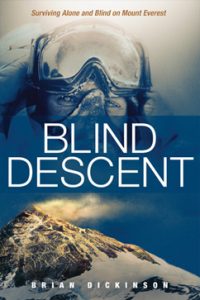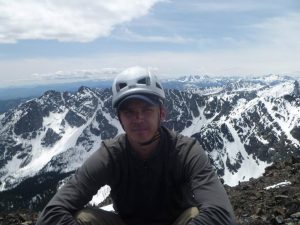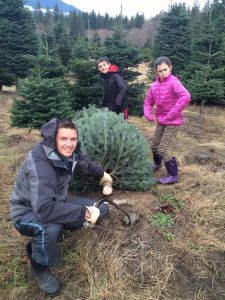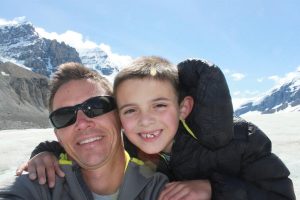Former Navy rescue swimmer has experienced a lot of adventure in his life. One memory that will always stay with him was when he was alone and snow blind while on the summit of Mount Everest. Brian was alone because his Sherpa became ill and had to turn back. Brian made the choice to keep climbing to the summit on his own.
Dickinson, who is a skilled climber, knew all the risks going in. After a few hours Brian made it to the top of the highest peak in the world. But one of his greatest achievements was short-lived. Right after he took a few pictures to document his climb his vision became blurry, his eyes started to burn, and within seconds, he was rendered almost completely blind.
Brian started to make his way back down the mountain using the survival training he learned while in the Navy. Plus he relied on his intuition as well as his faith. Brian recalls his story in the book, “Blind Descent.”
I got to talk with Brian about his near death experience, how his faith in God helped him survive, and a bit on fatherhood.
Art Eddy: In your book “Blind Decent” you share with your readers how you were stuck at the summit of Mt. Everest and was snow blind. You have climbed before, but never experienced that ordeal before. What was racing though your mind when you started to go blind?
Brian Dickinson: At 29,000 feet on the top of Mount Everest life is in slow motion. I actually soloed. I was completely alone on  the summit of Mount Everest. I was only one of a few people that have ever done that. I was completely alone and blind. A lot of my rescue swimmer training kicked in. I wasn’t going to panic. I stopped and dropped down to grab a rope.
the summit of Mount Everest. I was only one of a few people that have ever done that. I was completely alone and blind. A lot of my rescue swimmer training kicked in. I wasn’t going to panic. I stopped and dropped down to grab a rope.
I really just assessed the situation. I was blind. I was alone and thought that I got to get going. Without really overthinking it I started taking deliberate steps very slowly to make my way down the mountain.
AE: How long was it before you got rescued from the time you lost your sight?
BD: It should have taken me two to three hours to get to high camp which was at 26,000 feet. It is kind of the start of the death zone. It ended up taking me seven hours. I took some falls. I ran out of oxygen. I really just witnessed a miracle up there. My faith and my focus got me down.
AE: You were all alone after your Sherpa left you due to an illness. They say hindsight is 20/20. Would you have made the same choice if you were put into that spot again?
BD: If I knew that I was going to become snow blind I would have gone back down. At that moment up around 28,000 feet we definitely had a conversation. He was actually going to wait for me right there. He ended up going all the way down to the high camp. You just never know in climbing. My personal deal is that you never question others that are there when you are in the moment. You just don’t know all the variables.
We had a conversation. We agreed right there that I was going to go for the summit and then head back down. Then the unimaginable happened.
AE: In interviews you have said that you felt that you were not alone on Mt. Everest. What were some of the feelings or vibes that made you think that?
BD: I was using my other senses trying to get down. There were fixed lines. There were ropes attached to the rocks. I had my harness and all my gear on. It was just feeding my way down, going in and out of anchors over rocks. That whole time where I was completely blind and all alone I just felt this calming presence. It was like if you were in a room with someone else and you close your eyes. You know that they are still there. It was kind of like that same feeling. It kept me calm. I just kept moving.
AE: If someone ever finds themselves in your predicament what is the number one piece of advice you would offer them?
 BD: You have to weigh out a lot of factors. In the mountains it just depends on the exposure. How cold is it? How windy is it? How is the weather? Then there is your confidence level. In most cases you are roped up with a team. You have two fixed lines that are attached to the mountain.
BD: You have to weigh out a lot of factors. In the mountains it just depends on the exposure. How cold is it? How windy is it? How is the weather? Then there is your confidence level. In most cases you are roped up with a team. You have two fixed lines that are attached to the mountain.
For me I went up independent. I didn’t go up with a group. So I was there on my own. For every mountain and for every climb it is unique. So it is really hard to give advice there. It is really based on the person and the situation.
AE: Switching to fatherhood now, what are some of the morals you look to instill in your kids as they grow up?
BD: I have an eight year old and an 11 year old. A boy and a girl. For me I am wired a bit differently. My wife is a counselor and we offset each other pretty well. Faith is number one for us. Just living life to its fullest. I am a huge goal setter and I would like to instill that into my kids. I had the opportunity to bring them to a couple of the climbs. We actually all hung one of the climbs.
I always visit orphanages when I go to other countries and deliver toys. I was able to have them come to Argentina and do that with me after I climbed Aconcagua. Last year we all climbed Kosciuszko in Australia as a family. All four of us made the summit. Living an adventurous life even though we are all wired a bit differently and have unique characteristics, but sitting on the couch and playing video games is not big in our family.
AE: What is the biggest change from the time you were a kid to now as your children are growing up?
BD: This might be inaccurate, but kids today have a lot of information now. Social media and the societal values have changed with technology in the past couple of decades. It has been insane. As a kid I grew up in southern Oregon. Whether it was a good day or bad day my parents would tell me to go out and play. I got very creative and I am surprised I am still alive.
For our kids now, man it is tough. I travel and do motivational speaking for companies, but I also speak to the youth as well. It is so different with kids. I can see how difficult it is for kids these days growing up. Kids just get destroyed. They are trying to live up to these values that just don’t exist. They are false and are based on what people post and how many likes they have. It is really difficult.
I really enjoy speaking and showing where I came from. You just have to get out there and have your own identity and just own it. Don’t worry about what other people think or say. Every one of us has been created to be a unique person and we are all beautiful inside.
AE: What advice do you have for new dads out there?
BD: For new dads you are never ready. (Both laugh.) Don’t feel like you should be ready. I know when Joanna and I had Emily and she popped out. Next thing is that we have her in a little basket and we are expected to drive home. We were scared to death. We didn’t have a clue. Nobody has a clue. That is my number one advice.
The other is just instilling those values. Figure out what they are because they are unique for each individual. I understand that. Not everyone is going to be a climber or jump out of helicopters in the military. I might be a bit unique, but there are even more extremes as well as less extremes. Just hone in on your own individual values. What does the future you and your kid look like? Then you work backwards and develop some goals and be consistent.
Life of Dad Quick Five
AE: What is your favorite family movie you guys like to watch together?
 BD: It changes as the kids get older. We try to be really safe with what the kids watch. I love when new cartoons come out so we can all go to the theater together. We like “The Lego Movie,” but now Jordan is getting older so “Star Wars” has become a bigger hit with our family.
BD: It changes as the kids get older. We try to be really safe with what the kids watch. I love when new cartoons come out so we can all go to the theater together. We like “The Lego Movie,” but now Jordan is getting older so “Star Wars” has become a bigger hit with our family.
AE: Do you guys have a favorite song that you all like to sing and dance to as a family?
BD: Taylor Swift is huge in our house especially with Emily, but Jordan too because he is the younger brother and likes it by default. So anything by Taylor Swift at this point. We just crank it up. Jordan has my moves and he just shakes his bottom. (Both laugh.)
AE: Describe the perfect family vacation.
BD: Anything where we are together and there is some adventure to it. When we went to Australia back in February they drive on the opposite side of the road. That was my first experience with that. The kids loved it. It was like a video game where your life was on the line. While we were driving someone would yell out, ‘Hey kangaroo.’ We would get out and take pictures. It was just a fun time all around.
AE: Now that you have accomplished climbing Mt. Everest what is your next challenge you want to tackle?
BD: Everest was part of the seven summits. They are the highest peaks on the seven continents. I have climbed all seven. I haven’t climbed to the summit of Denali yet. I have been on it twice. I have actually splitboard and snowboarded it. I am looking to head back out there in May or June to complete that goal.
AE: Do you think that your kids will follow your footsteps and climb mountains when they get older?
BD: You ask them one day and they are proud when they see me talk on stage or at schools. They will want to climb. Then the next day it is completely the opposite. So you never know with kids. We will do things as a family. They are adventurous so I can see them following me.
Follow Brian on Twitter and check out his website here.
You can purchase Brian’s book, “Blind Descent” here.
